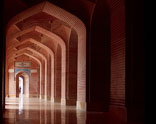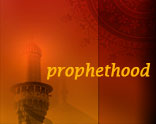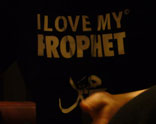As the existence of the wise Creator has been demonstrated by the inductive argument and the methods of scientific argument, so likewise the prophethood of Muhammad, peace be upon him and his household, will be demonstrated by means of the same scientific and inductive argument and through the same method we employ in proof of the various truths in our daily life and scientific investigation. Let us present some examples by way of introduction in proof of this truth as well.
If a man were to receive a letter from one of his relatives who is a youth studying in a small elementary school in a rural area, and if the recipient were to notice that the letter was written in a brilliant idiom, employing learned and precise expressions, manifesting high artistic ability, then he would certainly conclude that another person, highly educated and possessing an unusual ability of expression had dictated that letter to the youth. If we wish to analyze this argument and conclusion we may divide it into the following steps:
1- The letter was written ' by' a' country boy studying in an elementary school.
2- The letter is characterized by an eloquent style, a high level of artistic excellence and an unusual ability to arrange ideas.
3- The science of induction demonstrates in such situations that a youth of the characteristics noted in the first step could not formulate a letter of the qualities noted in the second step.
4- It must be concluded from all this that the letter was the product of another person of whose abilities the youth was able, in one way or another, to take advantage.
Let us present another analogy for the same idea, this time a scientific argument. It is the argument which scientists used in studying the electron. A scientist had studied a specific kind of ray which he produced in a closed tube. Then he focussed on the middle of the tube a magnetic devise shaped, like a horseshoe. He noticed that the rays tended to move toward the positive pole of the magnetic field and avoid the negative. He repeated the experiment under different circumstances until he become certain that rays may be attracted by magnetic power and that the positive pole is the one which attracts them. Since this scientist knew through inductive arguments and his study of other rays, such as those of ordinary light, that rays are not influenced by magnetic power or attracted by it and that a magnet attracts bodies, not rays, he was able to conclude that the attraction of the special rays on which he conducted his experiments could not be interpreted on the basis of the usual hypothetical information. He rather discovered a new force and a new truth, namely, that these rays are made of minute negative particles and are present in all material bodies because they are derived from various elements. These particles were named electrons.
The process of demonstration in both analogies may be summarized as follows: Whenever a specific phenomenon is observed, within the context of specific factors and concrete circumstances, it is noticed inductively that these factors and circumstances in similar situations do not necessarily lead to the same phenomenon. This points therefore, to another unseen factor which must be presupposed for interpreting that phenomenon. In other words, the conclusion, if it is greater than the circumstances and concrete factors in similar situations, as demonstrated through the inductive method, reveal an unseen factor behind these circumstances and concrete factors.
This attests to the proof of the prophethood of the greatest apostle, Muhammad, peace be upon him and his household, and the truth of the message which he declared to the world in the name of heaven. The application of the method to this argument takes the following steps:
1- The man who declared his message to the world in the name of heaven hailed from the Arabian peninsula which was one of most backward areas of the world at the time culturally, intellectually, socially, politically and economically. He belonged specifically to the Hijaz, a region of this peninsula which had not passed through even the limited developments of the cultures in neighbouring regions of the peninsula. Nor had it experienced any social development to speak of, or attained any share of the intellectual wealth of that, period worthy of mention.
Its poetry Sand literature reflected nothing of the intellectual currents of the world of that era. It was rather immersed, from the point of view of religious faith, in the chaos of polytheism and idolatry. The region had socially disintegrated under the burden of tribal mentality. Its society was therefore pray to tribal allegiances in all aspects of its life.
All this led to deep social conflicts, struggle and senseless, purposeless raids. The country in which this apostle grew up knew no form of government except that which tribal allegiances had dictated. The level of productive energy and the economic circumstances contributed nothing to distinguish the Hijaz from the most backward areas of the world at the time. Even reading and writing, which are the simplest rudiments of education, were rare in that environment, where society in general was an illiterate one.
﴾It Is He who has sent to the unlettered people' an apostle from among themselves, reciting to them and teaching them the Book and wisdom, although they were before in manifest error﴿. (Qur'an, 62:2)
The Prophet was, from this point of view, a typical person. He did not read or write before his apostleship, nor did he receive any formal or informal education.
﴾You did not recite before it (the Qur'an) any other scriptures, nor did you inscribe it with your right hand; otherwise the falsifiers would surely have doubted﴿. (Qur'an, 29:48)
This Qur'anic text is a clear depiction of the apostle's intellectual attainments before his apostleship. It is an incontrovertible proof even for those who do not believe in the divine origin of the Qur'an. It is, in any case, a text which the Prophet declared to his people and expounded in the presence of, those who were fully acquainted with his life and history, and no one objected to what he said. Nor did anyone deny his claim: We moreover observe that the Prophet did not take part before his apostleship, even in the intellectual forms of poetry and rhetoric which were popular among the people at the time. There was no mention of any distinction of the Prophet over the rest of his people, except in his moral commitments, his trustworthiness, honesty, truthfulness and integrity.
He lived among them for forty years before his apostleship without their sensing anything distinguishing him from them, except his pure conduct. No practical indications or trends towards the change which he declared to the world, after forty years of his noble life, reflected themselves in his behavior prior to that time.
Say: ﴾Had God so willed, I would not have recited it (the Qur'an) to you, nor would He have made it known to you. I have dwelt among you a lifetime: before it; do you not then understand?﴿ (Qur'an, 10:16)
The Prophet, peace be upon-him, and his household was born in Mecca where he lived the entire period prior to his apostleship. He did not leave it to go outside the Arabian peninsula except on two brief journeys. The first was with his uncle Abd Talib when he was still a youth in his early teens. The other was in his mid-thirties when he accompanied a caravan carrying Khadijah's goods for trade. Because of his inability to read or write, he had no opportunity to read any of the religious texts of the Jews or Christians. Nor did he become acquainted, to any appreciable extent, with these texts through his environment. Mecca was an idolatrous city both in its ideas and customs, into which neither Christian nor Jewish religious thought had penetrated. Religion had not entered into the life of its society in any form. Even the hanifs (pure ones) among the Arabs of Mecca who rejected the worship of idols were influenced by neither Judaism nor Christianity. Nothing of Jewish or Christian thought appeared to have been reflected in the literary or poetic heritage left for us by Qiss ibn Sa'idah and others of the group. Had the Prophet made any effort to be acquainted with Jewish or Christian thought, it would have been noticed. In such a simple environment which had no relation with the sources of Jewish or Christian thought, such an attempt would not have passed without attracting much attention and without leaving its imprint on many of the moves and relations that followed.
2- The message which the Prophet proclaimed to the world is embodied in the noble Qur'an and the Islamic sacred law (shari'ah) which has many distinguishing characteristics. First, it came in a unique form of divine instruction about God, praised and exalted be He, His attributes, His knowledge and power and the nature of the relationships which exist between him and humankind. The message also illustrated the role of prophets in the guidance of humanity, the unity of their messages, their unique values and examples. It spoke of God's ways (sunan) with His prophets and the continuous struggle between truth and falsehood and between justice and wrongdoing. It illustrated the close connection of heavenly messages .with those who are wronged and persecuted, and the opposition of the messages to those who exploit others through illegal interests and business deals. This divine instruction, furthermore, was not only greater than the religious level of a society immersed in idolatry; it was also greater than all the religious cultures known to the world at the time. Any comparison would clearly show that it came to correct whatever errors other religious systems contained, to balance whatever deviation they had suffered, and to bring them back to the judgement of the pure, native intuition (fitrah) of man and his untainted reason.
All this was brought by an unlettered man who belonged to an idolatrous society isolated from other societies. He was a man who knew almost nothing of the intellectual heritage or scriptures of his time. Yet he was the criterion of rectification and progress. The message, moreover, came with values and concepts regarding life, humanity, social relations and right action. It expressed these values and concepts in laws and ordinances which have been regarded even by those who do not accept their divine origin, to be among the most precious and noble ordinances known to human history.
Thus the son of a tribal society appeared on the stage of world history suddenly to proclaim the essential unity of humanity. The son of an environment whose people devised oppressive social forms of distinction and superiority based on ethnicity, lineage and socio-economic status, he came to destroy all such forms and to declare that all human beings are to be equal.
﴾....Surely the most noble of you in the sight of God is he who is most pious...﴿ (Qur'an, 49:13)
He made this declaration into a reality for men to live by. He raised the female, previously buried alive, to her rightful place of respect to equal the male in humanity and dignity.
The son of the desert whose people thought only of their petty cares and the alleviation of their hunger; whose men vied in glory within their clan distinctions, came to lead them to shoulder the greatest responsibilities. He unified them in the battle of human, liberty and the salvation of the wronged everywhere from the tyranny of Chosroe (Khusraw) and Ceasar.1
The son of a complete political and economic vacuum, in all its conflicts of usury, hoarding and exploitation, appeared suddenly to fill that vacuum and to make of that empty society an organized unity possessing a complex legal, economic and social order. He came to abolish usury, hoarding and exploitation and to redistribute wealth so that it might not be a commodity exchanged among the rich few. He came to establish social equality and security which other societies called for after centuries of social experimentation and development. All these turning points took place in a relatively short period of time, considering the slow pace of social changes.
This message speaks in the Qur'an of earlier prophets and their communities. It discusses events and crises in the life of these communities in details unknown to the illiterate and idolatrous environment of the Arabian Prophet. Jewish and Christian learned men challenged the Prophet on more than one occasion, asking him to discuss their religious heritage. He met these challenges with great courage. The Qur'an fulfilled their demands without there being any way of explaining how the Prophet himself could have acquired knowledge of these details.
You (Muhammad) were not at the western side (of at Tur, that is, Mount Sinai) when We decreed for Moses the commission, nor were you among those who witnessed it. But We raised generations, and life was prolonged for them. Nor were you a dweller among the people of Madian, reciting to them our verses: rather, We were the Sender. You were not on the side of the Mount (at-Tar) when We called (unto Moses); rather you were sent as a mercy from your Lord to warn a people to whom no warner came before you, that they, may be reminded. (Qur'an, 28:44-46)
What overwhelms the observer is that the true accounts related in the Qur'an could not have been a simple case of plagarism of the two testaments, even if we allow that the idea that the two Books were well-known in the Prophet's milieu. Plagarism is only a negative way of taking what someone else had to offer, whereas the Qur'an assumed the positive role of correcting and modifying these accounts. It presents details of a story with the purpose of purifying it from any accretions or contradictions which do not agree with inherent faith (fitrah) in Divine Oneness (tawhid), an enlightened mind and an uncorrupted religious view.
Another proof of the truth of the message is that the Qur'an attained such a high level of clarity, eloquence and originality of expression. This made it even from the point of view of those who reject its divine origin, an absolute criterion separating two stages in the history of the Arabic language and the basis of enormous change in this language, and its literary methods. The Arabs who heard the Prophet recite the Qur'an discerned the fact that it in no way resembled anything they had hitherto known in its power of elucidation and clarity of expression. One of them (al-Walid ibn al-Mughirah) declared when he heard the Qur'an, "By God, I have heard words which are neither the speech of men nor jinn! It is a speech of sweet savour and grace. Its top is fruitful and its bottom is copious. It exalts and none can surpass it. It truly destroys all that falls beneath it".2
The people did not allow themselves to listen to the Qur'an because they felt its great effect and because of their fear of its great power, as .it depicted the state of their souls. This is a clear proof of the great uniqueness of Qur'anic expression. It proves further that the Qur'an is not simply the continuation of a familiar development of a literary expression. The people had to succumb to the growing challenge with which the Prophet confronted them. The Qur'an challenged them to bring one like it, or even only ten surahs like it. It went on to stress their inability to bring even one surah like those of the noble Qur'an.
The Prophet offered this challenge to a society which excelled in no other craft as it did in that of words. It was a society which excelled in the art of story-telling (hadi'th) and the recounting of feats of glory. Their chief aim was to extinguish the light of this new message and destroy it. Nonetheless, this society, which was ready to meet any challenge, however great, did not wish to try itself and oppose the Qur'an in anything. It was because the people believed that the literary expression of the Qur'an was beyond their linguistic and artistic ability. The curious thing was that the man who brought them this new literary wealth lived among them for forty years without their seeing him take part in a literary debate or display any talent in the literary arts. These are just a few of the characteristics of the message which the Prophet proclaimed to the world.
3- Now we turn to the third step, through which we shall demonstrate, on the basis of scientific induction applied to the history of human societies, that this message (having the characteristics studied in the second step) is far greater than the factors and circumstances which we reviewed in the first step would allow. Although the history of human, societies has on many occasions, witnessed an outstanding man who led his society a step forward the case with which we are here concerned displays too, many exceptions to be just another instance of human success in history. We first observe here a tremendous power of innate religious intuition (fitrah), an all-inclusive evolution of all aspects of life and a reorientation of values and concepts which relate to the various areas of life, raising it to a better state instead of carrying it simply a step forward. Thus the society of tribes leaped forward, under the guidance of the Prophet, into the one universal society. The society of idols leaped suddenly to the faith of Divine Oneness (dinu-t tawhid) the religion which corrected the other monotheistic religions and removed from them all accretions of falsehood and legend. The empty society became full, even becoming a society of leadership bearing a culture which has illuminated the entire world.
We notice further that any complete revolution of society, if it is the child of concrete circumstances and causes, could not rise suddenly, improvised by one man. Nor could it be without connection with earlier developments which Pave the way for it. It cannot arise without a preceding current of intellectual and spiritual growth where in a form of able leadership is allowed to mature and assume its role. Such a leader would then work to revolutionize society on, the basis of this new development.
The comparative study of the processes of social evolution has clearly shown that an intellectual process of change begins in any society like seeds scattered in the soil of that society. Then these seeds rise together to constitute an intellectual current and gradually define its peculiar characteristics. It is then possible for a kind of leadership to grow within that current and bring it out onto the world stage as a front for a movement in opposition to the official establishment in society. Through a long struggle, this current widens until it gains control.
In contrast to all this, we find that Muhammad was not simply one link in a chain in the history of this new message. Nor was he part of a general current of social change. The values and concepts which he proclaimed were not simply seeds, or an intellectual wealth growing in the soil of the society in which he grew up. As for the current which developed in his hands, and which consisted of the few elect among the first Muslims it was the product of the message and the leader. It was not the climate which produced the message or the leader.
Thus the difference between what the Prophet brought and that of any other leader is not one of degree, such as can be found among the various elements constituting a new current of thought or social action. It was rather a fundamental and infinite difference. All this goes to prove that Muhammad was not part of a current, but that the new current was part of him.
History has proved that if the intellectual, religious or social leadership of a new trend is concentrated in one centre through a specific movement of intellectual and social change, that centre must possess the appropriate power and intellectual ability. It would also be necessary for these characteristics to be expressed in ways and methods familiar in the life of ordinary human beings. It would further be necessary for that current to have a gradual process of practical application that would produce and direct the development of leadership.
Again, in contrast with all this; we find that Muhammad himself assumed the intellectual religious and social leadership in spite of the fact that his situation, as an unlettered man who knew nothing of the intellectual achievements of his time or its prior religious traditions, did not make of him a candidate for such a role. Nor did he have any prior experience that would qualify him for this sudden responsibility.
In light of all this, we must come to the following conclusion, which alone offers us the only reasonable and acceptable explanation. We must presuppose an additional factor behind these concrete circumstances. It is the factor of revelation, the factor of prophethood which constitutes the intervention of heaven to guide earth.
Thus have We revealed unto you (Muhammad) a spirit of our command; you did not know what the Book is nor what faith is. But We made it (the Qur'an) a light with which We guide whosoever We wish from among our servants, and you surely guide to a straight path. (Qur'an, 42:52)
* The Revealer, The Messenger, The Message. By (Martyr) Mohammad Baqir as-Sadr. Translated by Dr. Mahmoud M. Ayoub. Part 2 "Th eMessenger". Published by: World Organization for Islamic Services. P.O Box No 22445 Tehran - Iran. First Edition 1980/1400.
1- Kisrah and Qaysar, the Persian and Byzantine emperors, as absolute monarchs, became for Muslims a symbol and oppression. (Translator's footnote)
2- The author does not provide his source, but for a variant version, see: Muhammad Yusuf al-Kandahlawi, Hayat as-Sahabah, Muhammad `Ali ad-Dawlah, ed., (Damascus: Dar al-Qalam), N.D., 1st edition, vol. l, p.114. (Translator's footnote)



















